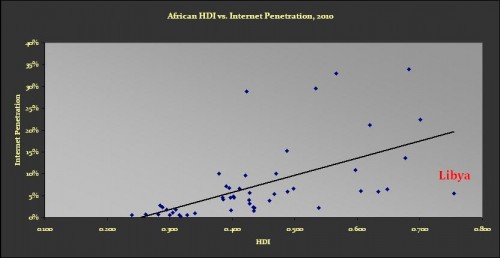Gaddafi’s stance on Internet shifts again
This Internet, which any demented person, any drunk can get drunk and write in, do you believe it? The Internet is like a vacuum cleaner, it can suck anything. Any useless person; any liar; any drunkard; anyone under the influence; anyone high on drugs; can talk on the Internet, and you read what he writes and you believe it.” – Muammar Al Gaddafi, in an address to the Libyan public
Colonel Gaddafi, leader of Libya (under various titles) since 1969, clearly does not trust the Internet. In recent years, however, Gaddafi had warmed to the medium, especially as an educational tool. Now, in 2011, Gaddafi ostensibly fears a domino effect from the recent Tunisian revolution: a showcase of the power of social media to mobilize the youth and initiate a regime change. Either way, this distrust of the Internet is by no means new; Gaddafi has censored the press to varying degrees during the past 40 years. Now, however, the Libyan leader’s unwillingness to acknowledge the merits of free expression can be considered a step backward for a leader who has managed to adapt ever-so-slightly with the times. After all, for much of his rule, telephones were not allowed in private residences.
How has Gaddafi interacted with the Internet?
- In 2007, the Washington Post, in a piece about how Gaddafi has adapted to capitalistic needs over time, reported that Gaddafi surfed the Internet.
- Ironically, in 2006, the BBC reported that the Libyan government, in collaboration with OLPC, was to provide 1.2 million laptops for its schoolchildren by mid-2008. At the time the OLPC deal was thought to fit with Gaddafi’s plan to create a more open Libya. Unfortunately, it is now 2011 and it’s safe to say that every child in Libya does not own an OLPC computer, let alone has access to a computer. But, imagine if Gaddafi had provided the tools for a social media revolution.
- In 2003, on a visit to Libya, Reporters Without Borders found that the Libyan internet was no longer censored although it still considers President Maummar Gaddafi to be a “predator of press freedom”.
Statistically, how has Libya not lived up to its potential?
- Despite its location on the Mediterranean, Libya is currently not connected to any undersea broadband cable. (EIG should be active soon, however.)
- Although Libya has the highest HDI of an African country, ranking 53rd out of 169 countries, its Internet user rate of 6% is substantially below the world average.
- The Internet penetration rate is much lower than neighboring Algeria (14%), Egypt (21%), Tunisia (34%).

Libya's Internet penetration is rather low for an African nation with such a high Human Development Index {Click to enlarge}
However, the relative lack of Internet resources for a nation of its type (read: Arab state, North African, no recent civil war, decent HDI), is not stopping the public from speaking out. It is unlikely that the “social media revolution” will be to this decade like the military coup was to the ’60s. Still, Libya’s Internet growth will welcome a change in leadership, or at least a change in policy. Gaddafi had been on the right track since 2003, but recent events may put further opening of the Libyan Internet on hold.
Update: On 2/18 and 2/19, Libya’s Internet was shut-down for a few daytime hours.












 Twitter
Twitter Facebook
Facebook Pinterest
Pinterest